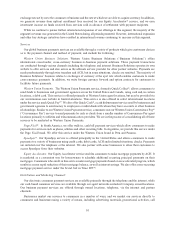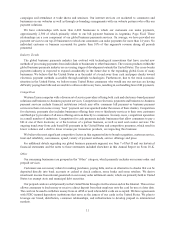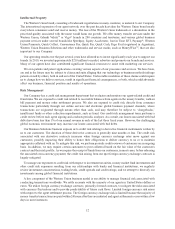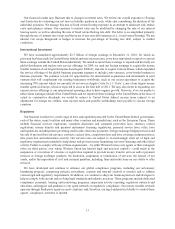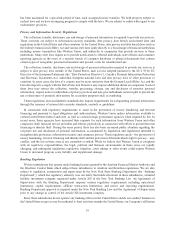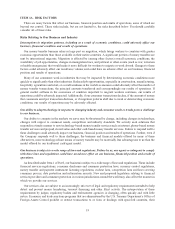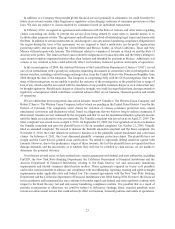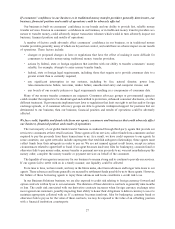Western Union 2010 Annual Report Download - page 22
Download and view the complete annual report
Please find page 22 of the 2010 Western Union annual report below. You can navigate through the pages in the report by either clicking on the pages listed below, or by using the keyword search tool below to find specific information within the annual report.governments, and in certain circumstances, their nationals, and with individuals and entities that are specially-
designated nationals of those countries, narcotics traffickers, and terrorists or terrorist organizations. As
U.S. federal and state as well as foreign legislative and regulatory scrutiny and enforcement action in these
areas increase, we expect that our costs of complying with these requirements will increase, perhaps substantially.
Failure to comply with any of these requirements—by us or by our agents and their subagents (who are third parties
over whom we have limited legal and practical control) could result in the suspension or revocation of a license or
registration required to provide money transfer services, the limitation, suspension or termination of services, the
seizure and/or forfeiture of our assets and/or the imposition of civil and criminal penalties, including fines. In
addition to those direct costs, a failure by us or by our agents and their subagents to comply with applicable laws and
regulations also could seriously damage our reputation and brands, and result in diminished revenue and profit and
increased operating costs.
In connection with regulatory requirements to assist in the prevention of money laundering and terrorist
financing and pursuant to legal obligations and authorizations, we make information available to certain United
States federal and state, as well as certain foreign government agencies when required by law. In recent years, these
agencies have increased their requests for such information from us and other companies (both financial service
providers and others), particularly in connection with efforts to prevent terrorist financing. During the same period,
there has also been increased public attention regarding the corporate use and disclosure of personal information,
accompanied by legislation and regulations intended to strengthen data protection, information security and
consumer privacy. These regulatory goals—the prevention of money laundering, terrorist financing and identity
theft and the protection of the individual’s right to privacy—may conflict, and the law in these areas is not consistent
or settled. While we believe that we are compliant with our regulatory responsibilities, the legal, political and
business environments in these areas are rapidly changing, and subsequent legislation, regulation, litigation, court
rulings or other events could expose us to increased program costs, liability and reputational damage.
Changes in the regulatory environment may also impact the manner in which we may operate our business or
may change the competitive landscape. Recently proposed and enacted legislation related to financial services
providers and consumer protection in various jurisdictions around the world and at the federal and state level in the
United States may subject us to additional regulatory oversight, mandate additional consumer disclosures, mandate
additional taxes or fees to be imposed upon consumers, or otherwise impact the manner in which we provide our
services.
For example, our business may be adversely impacted by the Dodd-Frank Wall Street Reform and Consumer
Protection Act (the “Financial Reform Act” or “Act”) which became law in the United States on July 21, 2010. At
this time, we are unable to predict the impact on our business because many of the provisions of the Act that could
affect us require the adoption of rules or mandate studies, which could result in additional legislative or regulatory
requirements. The Financial Reform Act creates a new Bureau of Consumer Financial Protection (the “Consumer
Protection Bureau”) whose purpose will be to issue and enforce consumer protection initiatives governing financial
products and services, including money transfer services, which will require us to provide enhanced disclosures to
our money transfer customers. Depending upon the final rules to be issued by the Consumer Protection Bureau, we
may need to modify our systems to provide these additional disclosures or we may be liable for the failure of our
money transfer agents to comply with the Act, the extent of which liability will be determined by rules not yet
enacted. In addition, rules adopted under the Act by other governmental agencies may subject our corporate interest
rate and foreign exchange hedging transactions to centralized clearing and collateral posting requirements. Also,
our Western Union Business Solutions (“Business Solutions”) business in the United States may be subjected to
increased regulatory oversight and licensing requirements relating to the foreign exchange derivative products
offered to certain of its customers.
Other examples of such regulatory changes are the Payment Services Directive (“PSD”) in the European Union
(“EU”) which became effective in late 2009, and a similar law, the Funds Settlement Act, enacted in Japan in 2010.
The PSD has changed the payments market in the EU, harmonizing the licensing and certain other requirements for
offering payment and other financial services, including remittances within the EU. Previously, those requirements
differed significantly among these countries. Further, the PSD and the Japanese law imposed new rules on payment
service providers like Western Union. In particular, Western Union has become responsible for the compliance of its
agents and their subagents in those jurisdictions who are engaged by one of our payments institution subsidiaries.
20


